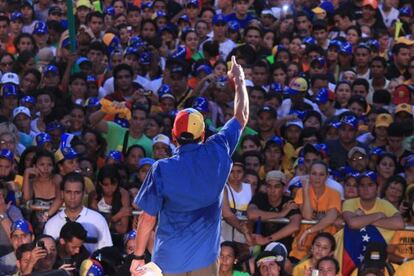Capriles clashes with the power of Chávez’s election machine
A short race and vast government resources are putting the opposition at a disadvantage

For nearly three months, Venezuela was governed by a president who remained unseen. Now the South American nation is finding itself in the midst of a presidential race – to seek a successor to the late Hugo Chávez – that is yet to officially begin.
Rules announced earlier this month by the National Electoral Council (CNE) allow for only 10 days of campaigning: from April 2 to midnight April 11. The vote will be held three days later.
Nevertheless, this past Saturday, the two major candidates coincided in Maracay, the capital of Aragua state, some 100 kilometers west of Caracas, where they held separate public events. Nicolás Maduro, the interim president and Chávez’s handpicked successor, closed a rally with the announcement of a new youth movement organized to help fight crime. In El Limón, a ward in this city of about 1.75 million people, opposition candidate Henrique Capriles spoke at another rally that was doused by rain. The event was called a “citizens assembly.”
There is no time to lose. This is a very short campaign that has suddenly been thrown at Venezuelans, as was the surprise March 5 announcement of Chávez’s death as he supposedly recovered from cancer surgery.
Maduro’s double role as interim president and ruling party candidate has raised questions about whether his public appearances are official
Maduro’s main campaign poster carries a picture of Chávez instead of the candidate himself. “Maduro, from my heart,” reads the slogan, which appears to be in the deceased president’s handwriting.
Maduro’s double role as interim president and ruling party candidate has raised questions about whether his public appearances are official and if his campaign rallies are being paid for by the government. The 1999 Constitution, which was introduced by Chávez, prohibits the public financing of campaigns. So Capriles has been free to look for donations from private contributors, mostly from those in the business sector, who fear that the state will take control of their holdings under Maduro or subject them to severe regulations as pressure tactics.
This campaign has kept Capriles from embarking on a plan-of-action: going house-to-house meeting with people, a strategy he claims helped him close the gap last October when he lost to Chávez by 11 percent.
Instead, Capriles has had to rely on mass public meetings, which the opposition has hoped would generate news coverage. According to campaign director Carlos Ocariz, Capriles visited 11 cities outside of Caracas last week.
Nevertheless, Ocariz complained that Capriles has not been getting equal time from many of Venezuela’s broadcasters. Globovisión – the cable television network that was critical of the Chávez government, and is under threat of being sold to owners who side with the ruling party – has been the only broadcaster that has actively covered the Capriles camp and openly supports the opposition.
Many private radio stations, Ocariz charged, have refused to broadcast Capriles’ messages or cover his rallies because they fear they will lose government advertisements and other financing. Without naming her specifically, Ocariz last week accused the president of the Venezuelan Broadcasters Association, Enza Carbone, of censuring Capriles’ messages to voters.
“You are not the one who should be reviewing the content of campaign advertising,” he said
Tu suscripción se está usando en otro dispositivo
¿Quieres añadir otro usuario a tu suscripción?
Si continúas leyendo en este dispositivo, no se podrá leer en el otro.
FlechaTu suscripción se está usando en otro dispositivo y solo puedes acceder a EL PAÍS desde un dispositivo a la vez.
Si quieres compartir tu cuenta, cambia tu suscripción a la modalidad Premium, así podrás añadir otro usuario. Cada uno accederá con su propia cuenta de email, lo que os permitirá personalizar vuestra experiencia en EL PAÍS.
¿Tienes una suscripción de empresa? Accede aquí para contratar más cuentas.
En el caso de no saber quién está usando tu cuenta, te recomendamos cambiar tu contraseña aquí.
Si decides continuar compartiendo tu cuenta, este mensaje se mostrará en tu dispositivo y en el de la otra persona que está usando tu cuenta de forma indefinida, afectando a tu experiencia de lectura. Puedes consultar aquí los términos y condiciones de la suscripción digital.








































